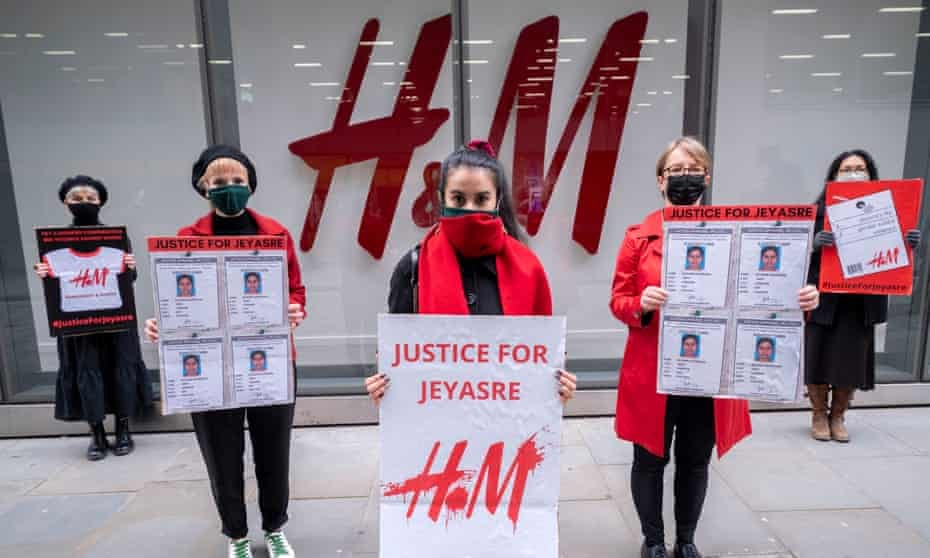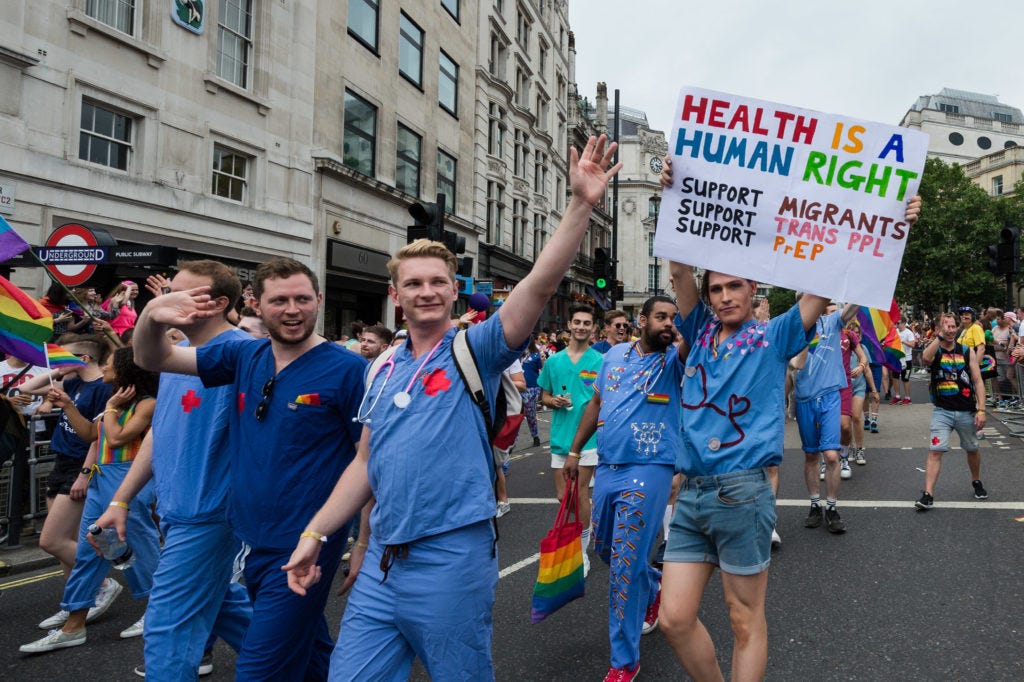Global Roundup: H&M Pledges To End Shopfloor Sexual Violence in India After Worker Killed, Zimbabwe Decriminalizes HIV Transmission, UK Medical Bodies Tell Govt. To End Trans Conversion Therapy
Curated by FG intern Lydia Georgison
A protest in London last year after the murder of Jeyasre Kathiravel, a Dalit woman who was allegedly sexual harassed while working for an H&M supplier in India. Photograph: Jess Hurd via The Guardian
In January 2021, Jeyasre Kathiravel, a 20-year-old Dalit woman, was found dead on farmland near her family home after finishing a shift at Natchi Apparel, a factory making clothes for H&M in Kaithian Kottai, Tamil Nadu.
Her supervisor reportedly confessed to her murder and is awaiting trial. Her family also alleged that she was raped before being killed and had suffered sexual harassment and intimidation at work months before her death but felt powerless to prevent the abuse.
Last year, an independent investigation by the Workers’ Rights Consortium, which has not yet been made public, heard testimony from other female workers of widespread gender-based violence at Natchi Apparel, and H&M and Eastman Exports then began talks with the Tamil Nadu Textile and Common labour rights groups.
The legally binding agreement that resulted is only the second of its kind in the fashion industry and the first time a brand has ever signed up to an initiative to tackle gender-based violence in Asia’s garment industry, where a workforce of primarily poor women make millions of tons of clothing for UK high streets every year.
Under the terms of the agreement, all workers, supervisors, and executives will have to undergo gender-based violence training, and the TTCU will recruit and train female workers as “shopfloor monitors.” They will ensure that women are protected from verbal harassment and sexual intimidation.
Women will now be able to report sexual harassment anonymously to an independent panel that will have the power to dismiss perpetrators and seek financial compensation for victims and their families.
It is our top priority to make sure that women on our shopfloors are safe and to do that women must be able to be seen and heard and feel empowered to report if something goes wrong…We will not allow any kind of infraction of the terms of this agreement. This is not just zero tolerance, what we want is a complete elimination of harassment and all forms of violence against our female employees. - Subhash Tiwari, director at Eastman Exports
Thivya Rakini, state president of the TTCU, said the agreement was a victory for women in the workplace.
We believe this has the power to change things and has meant that something good has come from the terrible tragedy of Jeyasre’s death. This has shown the power of a Dalit woman workforce to seek justice and we look forward to working with factory management. - Thivya Rakini
The Asia Floor Wage Alliance (AFWA) and the international labour rights group Global Labour Justice-International Labor Rights Forum, also co-signatories to the agreement, said this should be seen as a moment of change for the fashion industry.
We are confident that this agreement can be a model for change across the global garment industry, where gender-based violence is endemic and still largely disregarded and ignored. - Anannya Bhattacharjee, the international coordinator at AFWA
In 2019, the US brands Levi Strauss, Wrangler Jeans and The Children’s Place signed the Lesotho Agreement, the first industry accord to tackle gender-based violence after a WRC investigation that uncovered the systematic sexual assault of more than 120 women at three jeans factories in Lesotho.
Credit: Canva; Elham Numan/Xtra
In March, Zimbabwe President Emmerson Mnangagwa signed legislation making bride prices a regular payment made by a prospective groom’s family to his bride-to-be’s relatives mandatory under national law.
While the bill was seemingly unrelated to HIV transmission, Clause 53 of the Marriages Amendment Bill stripped criminal penalties when individuals knowingly or unknowingly expose their sexual partner to HIV.
Before the legislation’s passage, any act of HIV transmission could result in a sentence of up to 20 years in prison under Section 79 of Zimbabwe’s Criminal Code. According to Newsday local media publication, the statute was seldom enforced, but at least 16 people were targeted under Section 79 between October 2015 and December 2018.
Human rights activists lauded the repeal of Section 79, which was enacted in 2001. The passage of its Sexual Offences Act 21 years ago made Zimbabwe the first African country to criminalize HIV transmission, which critics warned made it more challenging to address the epidemic.
In a statement, the Joint United Nations Programme on HIV/AIDS (UNAIDS) claimed the now-repealed law was a primary “driver of stigma and discrimination for people living with HIV and other key populations.”
Public health goals are not served by denying people their individual rights and I commend Zimbabwe for taking this hugely important step. This decision strengthens the HIV response in Zimbabwe by reducing the stigma and discrimination that too often prevents vulnerable groups of people from receiving HIV prevention, care and treatment services.- Winnie Byanyima, UNAIDS executive director
In recent years, other African countries have also made moves to strike down their discriminatory HIV transmission statutes. In 2015, the Kenya High Court said that laws targeting people living with HIV violated individual privacy and declared them unconstitutional.
However, as Newsday reports, at least two dozen nations in sub-Saharan Africa still have similar laws on the books. While repealing its HIV criminalization laws is a significant step, critics say Zimbabwe’s criminal codes outlawing same-sex intercourse threaten the move’s effectiveness.
Any act of “intentional sexual relations between two human males” can result in up to 10 years in prison and a fine. Zimbabwe strengthened those laws in 2006 by criminalizing virtually any form of intimacy between men, even hugging and holding hands.
In a 2015 report from the global news agency Inter Press Service, Zimbabwean LGBTQ+ activists said the anti-sodomy codes made it difficult to seek health care. They cited overwhelming stigma and lack of knowledge on the part of health providers regarding queer and trans people.
In as far as combatting HIV/AIDS is concerned, there are no national programmes targeted for minority groups or interventions that can easily be accessible by the LGBTI community on prevention and care within the public healthcare system. - Samuel Matsikure, program manager of the advocacy group Gays and Lesbians of Zimbabwe (GALZ)
The lack of resources has resulted in what appear to be elevated rates of HIV among LGBTQ+ Zimbabweans. The country’s embassy released a report in 2020 estimating that 12.9 percent of Zimbabwe’s 1.2 million adults are living with HIV. GALZ approximates that 15 percent of its 6000 members are HIV-positive.
It’s unclear how many members of Zimbabwe’s LGBTQ+ population have been able to access medications to manage the virus. Still, GALZ said that, on average, 10 to 15 members of the group die each year from complications related to HIV.
NHS doctors at Pride in London in 2019. (Wiktor Szymanowicz / Barcroft Media via Getty Images) via Pink News
The British Medical Association (BMA), the UK Council for psychotherapy and the Royal College of Psychiatrists, among others, have all urged the government to extend the ban to trans people.
Dr. Latifa Patel, acting chair of the BMA’s representative body, said the trade union has long opposed “backwards” conversion therapy.
For the government to exclude trans Brits from the ban “isn’t enough. It’s with great dismay to read reports that [the ban] will not extend to transgender people, despite there being no evidence whatsoever that it is a credible form of medicine, Dr. Patel said.
The UK Council for Psychotherapy said that gender-affirming therapies for trans youth could be a lifeline. It added that it has “repeatedly offered to support the government in developing legislation in this complex area, to protect people from conversion therapy without impacting safe, ethical therapy.”
Boris Johnson has insisted that banning trans conversion therapy is “complex,” wrongly suggesting that a ban could prevent discussion of gender identities. The British Association for Counselling and Psychotherapy said it was “shocked and disappointed” by the prime minister’s move.
A ban that only addresses conversion therapy for sexuality and not gender identity is inadequate. - The British Association for Counselling and Psychotherapy
Dr. Adrian James, president of the Royal College of Psychiatrists, agreed.
Conversion therapy causes severe physical and psychological suffering, violates the human rights of all LGBTQ+ people, and has been called a form of torture. - Dr. Adrian James
The British Psychological Society, the Anna Freud National Centre for Children and Families and mental health charity Mind issued similar statements, questioning why the government has ignored its research that found trans-Brits are more likely to have undergone or been offered conversion therapy.
The government has confirmed that a long-promised, trans-inclusive ban on conversion therapy was being dropped for one that outlaws practices seeking to change sexuality only.
More than 120 LGBT+ organizations and HIV campaign groups pulled out of the government’s flagship LGBT+ conference, Safe To Be Me, resulting in its cancellation.
On April 6, health secretary Sajid Javid said that the government excluding trans people is part of a more “sensitive approach,” an idea quickly dismissed by the trans-led charity Gendered Intelligence.
What the health secretary is suggesting is that practices that are so barbaric and outdated that they ought to be banned should remain legal against a single vulnerable group. - Gendered Intelligence
Lydia Georgison (she/her) is a first-year student at the University of Ottawa. She is passionate about becoming a feminist by learning and broadening her knowledge of topics that have to do with feminism. She spends most of her time studying in the field of criminology.
Lydia strongly believes the key to excellence within society is listening and learning from everyone’s opinions. She suggests that the key to a peaceful and accepting community is the result of educating ourselves on controversial topics.







